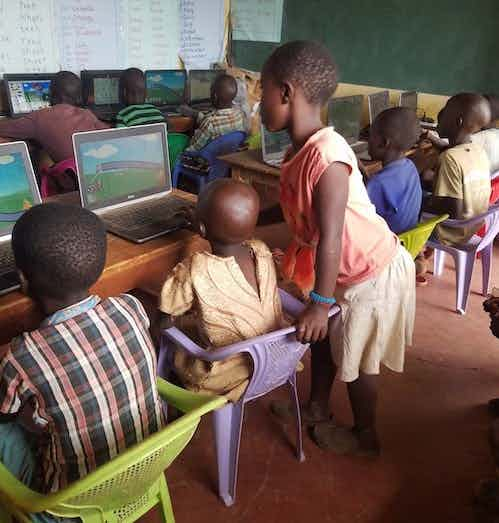
(1/10) Open Lab Handbook - Equal Access

In Short
TechLit builds computer labs in rural Africa and supplies computers to rural African schools and libraries. This one of many posts sharing what we learned while running an open computer lab in 2019.
If you're busy running a computer lab and just need a summary, here's what we have to say:
- Let students explore without interruption.
- Set predictable boundaries around access.
- Build a safe and inviting atmosphere.
Rural Schools And Libraries
We build computer labs in rural Africa.
TechLit builds computer labs in rural Africa. This one of many posts sharing what we learned while running an open computer lab in Mogotio, Kenya, in 2019.
This series is for rural schools and libraries.
This series is for rural schools and libraries. Specifically, it is for those with limited data or electricity, and for those who are starting to introduce computers to their classrooms.
We Foster Tech Literacy
Content alone does not build tech literacy.
Our mission is to foster tech literacy -- *the confidence and knowledge you need to take advantage of technology.* Many organizations focus on providing content, but after a few years of providing content, we learned that content alone does not build tech literacy.
Tech literacy comes from practice.
We focus on immersion for primary-school students, because we believe early adoption of technology leads to long-term benefits. Our approach is to mix games and learning together so that students are excited to practice. This is the best approach because tech literacy comes from practice.
Unleashing Curiosity
We learned how to encourage self-teaching.
We believe that self-teaching is a important part of tech literacy. For example, if you are tech literate, you can often use the internet to answer your questions. We learned how to encourage self-teaching.
Learning computers became the most popular activity in town.
Over time, we found a few activities that drew crowds of students returning day after day. We noticed some students becoming curious, confident and even helping others through tech problems. This reinforced what we believed before, that tech literacy comes from practice. Learning computers became the most popular activity in town.
Games are the most effective incentive for computer practice.
At first, we were hesitant to encourage these activities, but they caused the learning outcomes we needed. We only had one computer game on the computers at first, but when we added more, we saw the outcomes improve. Games are the most effective incentive for computer practice.
Setting Boundaries
Bigger kids can bully younger kids, leading to unequal access.
Our conservative approach to curriculum meant that our labs early on were chaotic. This led to one serious problem. Bigger kids can bully younger kids, leading to unequal access.
Each student deserves to use a computer uninterrupted and free of peer-pressure.
The majority of kids travel accross town to spend hours watching their peers use computers. That amount of curiosity was being wasted. We saw it as our duty to enforce clear boundaries, because we believe that each student deserves to use a computer uninterrupted and free of peer-pressure.
We saw differences in ability disappear within days.
Each student at our open lab was entitled to twenty minutes with their own computer. We saw differences in ability mostly disappear within days. Every student learned, mostly on their own, how to find, launch and close applications.
Setting clear boundaries encourages planning, focus and reflection.
Having less time on the computer meant the students needed to focus. It caused them to reflect on their previous sessions and plan their next sessions carefully.
Building Community
Setting boundaries causes students to wait and watch nearby.
Within a few weeks of establishing clear boundaries, our lab was overflowing with students. We had to start sessions earlier just to give everyone a turn. Ultimately, setting boundaries caused students to wait and watch nearby.
Meeting every student at the front door is necessary and beneficial.
We needed to keep track of names to ensure everyone had a turn. This forced us to meet every student at the front door. But it was more than necessary, it was also beneficial. We were able to set expectations about behavior early, to explain where the restrooms and water were and to tell them about new content and upcoming events.
Providing shade, water and entertainment make waiting possible.
We noticed that the longer the wait time, the more students would leave before using a computer. To make the wait easier, we opened a faucet and found cups for drinking. Available rooms nearby were made into waiting rooms for waiting students to stay out of the sun. Finally, we used a TV to play educational content like documentaries and cartoons to make use of their downtime.
To Summarize
Here's what we learned:
- Let students explore without interruption.
- Set predictable boundaries around access.
- Build a safe and inviting atmosphere.
What You Can Do
You can request computers from us.
We send computers to partner organizations. If you help run a rural school or library, you can request computers from us. We will provide an online form to apply soon. For now, email us to apply for computers.
You can use our games and content for free.
If you already have computers or want to try or contribute to our games and content, you can use our games and content for free. We will provide instructions for using our software soon. For now, email us to use our games and content.
You can subscribe to our newsletter.
If you want to support us, learn more about our work or share your stories, you can subscribe to our newsletter or follow us on Instagram, LinkedIn, Twitter and Facebook.
About The Author

Tyler Cinnamon is a American programmer and entrepreneur. He started TechLit Africa with Nelly Cheboi in 2018 to disrupt poverty with used IT devices.